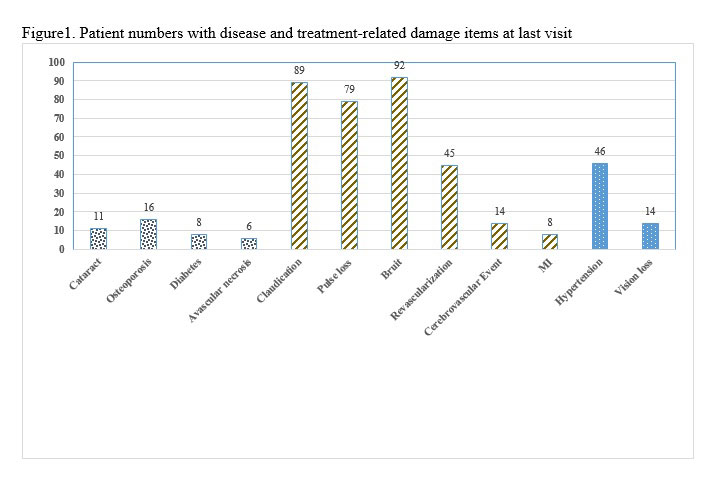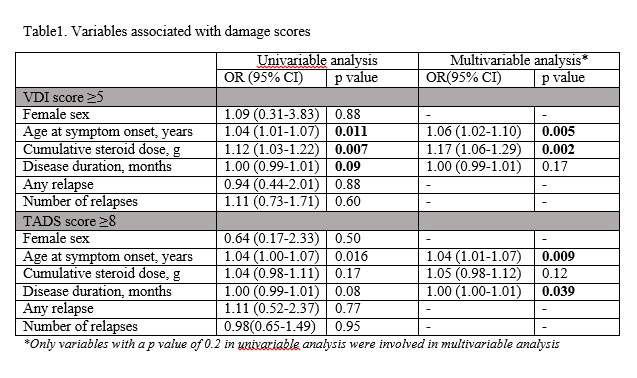Session Information
Session Type: Poster Session (Sunday)
Session Time: 9:00AM-11:00AM
Background/Purpose: As a large-vessel vasculitis of young-age group, Takayasu‘s arteritis (TAK) have a high morbidity and mortality caused by the disease or treatments such as corticosteroids. In this study we aimed to evaluate the damage in our Takayasu‘s arteritis patients by using Vasculitis Damage Index (VDI) and Takayasu‘s Arteritis Damage Score (TADS).
Methods: Takayasu arteritis patients fullfilling the ACR 1990 criteria and had >6 months follow-up were enrolled in this single-center study retrospectively. Data was collected from patients charts. TADS and VDI scores at diagnosis and at the end of the follow-up were evaluated and compared with baseline damage. Variables associated with damage scores were evaluated.
Results: One-hundred fourteen patients (F/M: 101/13) were included in the study. The mean age at diagnosis, median symptom duration at baseline visit and mean follow-up duration were 35.3±13.3 years, 12 (0-360) months and 76.9 ± 51.4 months, respectively. Median VDI score was 4 (1-8) and median TADS score was 7 (1-15) at baseline assessment. At the end of the follow-up median VDI score was 5.0 (1-17) and median TADS score was 8.0 (1-19). Median ΔTADS was 1 (0-9) and ΔVDI was 1 (0-11). The median number of disease-related items were higher in TADS scoring (8 items vs 4 items). At least 1 new corticosteroid-related damage item occured in 35 patients (31%) (Figure 1). Age at symptom onset and cumulative CS doses were predictor factors for higher VDI score (≥5) in multivariate logistic regression analysis. Also age at symptom onset and disease duration were associated with increase in TADS (≥8). Gender and any relapse or number of relapses were not found to be associated with damage scores (Table 1).
Conclusion: In Takayasu arteritis, detecting the disease- and treatment-related part of damage must be considered while monitoring the disease. VDI seems to be predominantly evaluating the treatment-related damage, whereas TADS provides more detailed information on disease-related damage. Older age at symptom onset, disease duration and cumulative CS dose were associated with higher damage scores. Interestingly, the relapse frequency did not influence the damage level in our routine-follow-up of TAK patients.
To cite this abstract in AMA style:
Kaymaz-Tahra S, Alibaz-Oner F, Direskeneli H. Damage in Takayasu‘s Arteritis Is Associated with Age at Symptom-onset, Disease-duration and Corticosteroid Dose but Not Relapse in Routine Follow-up [abstract]. Arthritis Rheumatol. 2019; 71 (suppl 10). https://acrabstracts.org/abstract/damage-in-takayasus-arteritis-is-associated-with-age-at-symptom-onset-disease-duration-and-corticosteroid-dose-but-not-relapse-in-routine-follow-up/. Accessed .« Back to 2019 ACR/ARP Annual Meeting
ACR Meeting Abstracts - https://acrabstracts.org/abstract/damage-in-takayasus-arteritis-is-associated-with-age-at-symptom-onset-disease-duration-and-corticosteroid-dose-but-not-relapse-in-routine-follow-up/


